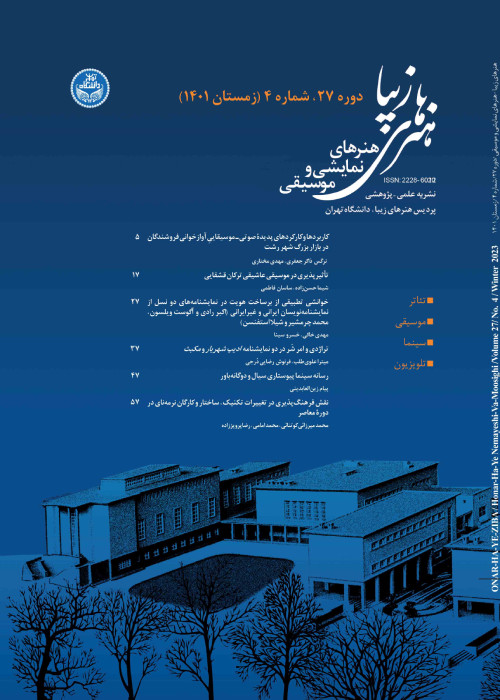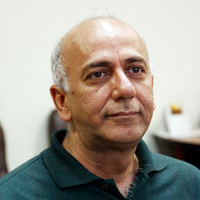Âshiq in the Musical Culture of Qashqâyi Turks Investigating the Acculturation
Author(s):
Article Type:
Research/Original Article (دارای رتبه معتبر)
Abstract:
Qashqâyis were nomads who migrated to the southern region of Iran and formed a single ethnic group; a tribe consisting of Turks, Kurds, Lors and Arabs. Since the majority of this tribe were Turks, the main language of the Qashqâyis was Turkish, from the Caucasian Turkish language root. The provinces of Isfahan, Chahar Mahall Bakhtiari, Kohkiluyeh and Boyer-Ahmad, Khuzestan, Bushehr and most importantly, Fars constitutes the Qashqâyi regions of Iran. In the past, the Qashqâyi society was a hierarchical society consisting of different social classes and the Ilkhâni family was at the head of this hierarchical system, and led the tribal affairs, thus distinguishing this tribe from others. In this hierarchical system, musicians were placed in the lowest social classes. Music has always been present in all social classes of the Qashqâyi tribe. Qashqâyi musicians include Âshiqs, Changis, Sârebâns, non-professional musicians, and women, each of whom, have their own repertoires. The Âshiqs's repertoire is one of the five repertoires of the Qashqâyi musical culture that has undergone many changes. The Âshiqs migrated to Fars from the north-west regions and joined the Qashqâyi tribe. They, who were from the lowest social classes, joined the Qashqâyi tribe. With the support of the Ilkhâns, the Ashiqs improved their art and made changes in their repertoire. Eventually, with the disappearance of the Ilkhâni system, this musical tradition also declined. The Âshiqs performed music and were financially supported by the Ilkhâns. In fact, the musical life of the Âshiqs depended on the presence of the Ilkhâns which collapsed with the abolition of the Ilkhâni system. There have been many acculturations and changes in the music of Qashqâyi Âshiqs. Most of them have their roots in the hierarchical system of the tribe and have emerged in such a cultural context. In the hierarchical system of Qashqâyi society, elements were often accepted and preserved in this musical culture which were approved by the upper class of this society. In fact, changes in this music have often been accompanied by the presence of people from the upper classes of this society, serving as an authoritative body in regards to the changes in the musical culture of the Ashiqs. The change in the living conditions and the urbanization of the Qashqâyis isolated the Âshiqs and their repertoire, over time, diminished and eventually was eliminated from Qashqâyi music. In fact, lifestyle changes brought about many changes in this musical culture and caused a large part of the musical experience of this repertoire to diminish and disappear; most of these changes were influenced by intercultural influences. This study, which introduces the Âshiqi's music of Qashqâyi and examines the acculturation in this repertoire, is based on fieldwork in Qashqâyi regions and interview with Qashqâyi musicians and aims to introduce and study the changes resulting from cultural encounters in this music.
Keywords:
Âshiq , Qashqâyi , Acculturation , Changes
Language:
Persian
Published:
Honar-Ha-Ye-Ziba: Honar-Ha-Ye Mosighi Va Namayeshi, Volume:27 Issue: 76, 2023
Pages:
17 to 24
magiran.com/p2533478
دانلود و مطالعه متن این مقاله با یکی از روشهای زیر امکان پذیر است:
اشتراک شخصی
با عضویت و پرداخت آنلاین حق اشتراک یکساله به مبلغ 1,390,000ريال میتوانید 70 عنوان مطلب دانلود کنید!
اشتراک سازمانی
به کتابخانه دانشگاه یا محل کار خود پیشنهاد کنید تا اشتراک سازمانی این پایگاه را برای دسترسی نامحدود همه کاربران به متن مطالب تهیه نمایند!
توجه!
- حق عضویت دریافتی صرف حمایت از نشریات عضو و نگهداری، تکمیل و توسعه مگیران میشود.
- پرداخت حق اشتراک و دانلود مقالات اجازه بازنشر آن در سایر رسانههای چاپی و دیجیتال را به کاربر نمیدهد.
In order to view content subscription is required
Personal subscription
Subscribe magiran.com for 70 € euros via PayPal and download 70 articles during a year.
Organization subscription
Please contact us to subscribe your university or library for unlimited access!



